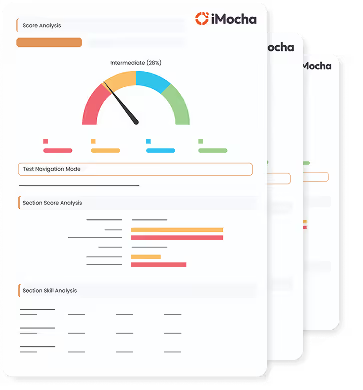


Choose easy, medium, or tricky questions from our skill libraries to assess candidates of different experience levels.
Choose easy, medium, or tricky questions from our skill libraries to assess candidates of different experience levels.

Choose easy, medium, or tricky questions from our skill libraries to assess candidates of different experience levels.

Choose easy, medium, or tricky questions from our skill libraries to assess candidates of different experience levels.
This a comprehensive PDF report, which you can instantly download and share with your hiring team or candidates for seamless collaboration.
Download Sample Report



iMocha's wealth manager test is the ideal pre-hire test for recruiters and hiring managers to assess candidates objectively. Our test is useful for hiring a Wealth Manager. This wealth manager aptitude test has helped our customers to reduce technical screening time by 80%.





%20(1).webp)
Most often employed by banks and various types of investment firms, wealth managers provide financial planning services and investment advice to high-net-worth individuals. Since the essential goal of any wealth manager is to sustain and increase their clients' long-term wealth, the profession involves a number of quite diverse disciplines.
Indeed, wealth managers routinely provide their clients with the following services: customized banking solutions, estate and probate planning, general legal counsel, tax advice, and investment management. Wealth managers must have at least a rudimentary understanding of capital economics, major investment theories, and the networked web of modern global markets. Since they manage vast sums of money for other people, it goes without saying that they must also be ethical, trustworthy, and free of any felonious record involving larceny, fraud, or intentional mismanagement.
Responsibilities include:
KEY SKILLS REQUIRED:

VERBAL ABILITY
Verbal ability is essential because grammar and vocabulary are prerequisites for good spoken and written English.
VERBAL REASONING
Reading comprehension indicates an ability to comprehend and reason with the concepts on a written page.
QUANTITATIVE APTITUDE
Quantitative ability will indicate analytical thinking and problem-solving ability.
LOGICAL REASONING
Logical reasoning is assessed through
These questions will indicate the quality of deductive and inductive reasoning, contributing to critical thinking ability.
ABSTRACT REASONING
Abstract reasoning indicates the ability to think, identify logical patterns, learn new skills and solve complex problems. It is an indicator of fluid intelligence and shows an ability to strategize.
FINANCIAL ANALYSIS
Financial Analysis covers topics on ratios, leverage, working capital, etc.
This test may contain MCQs (Multiple Choice Questions), MAQs (Multiple Answer Questions), Fill in the Blanks, Whiteboard Questions, Audio/Video Questions, Job-based Simulations, True or False Questions, etc.







.webp)
.webp)
.webp)
.webp)